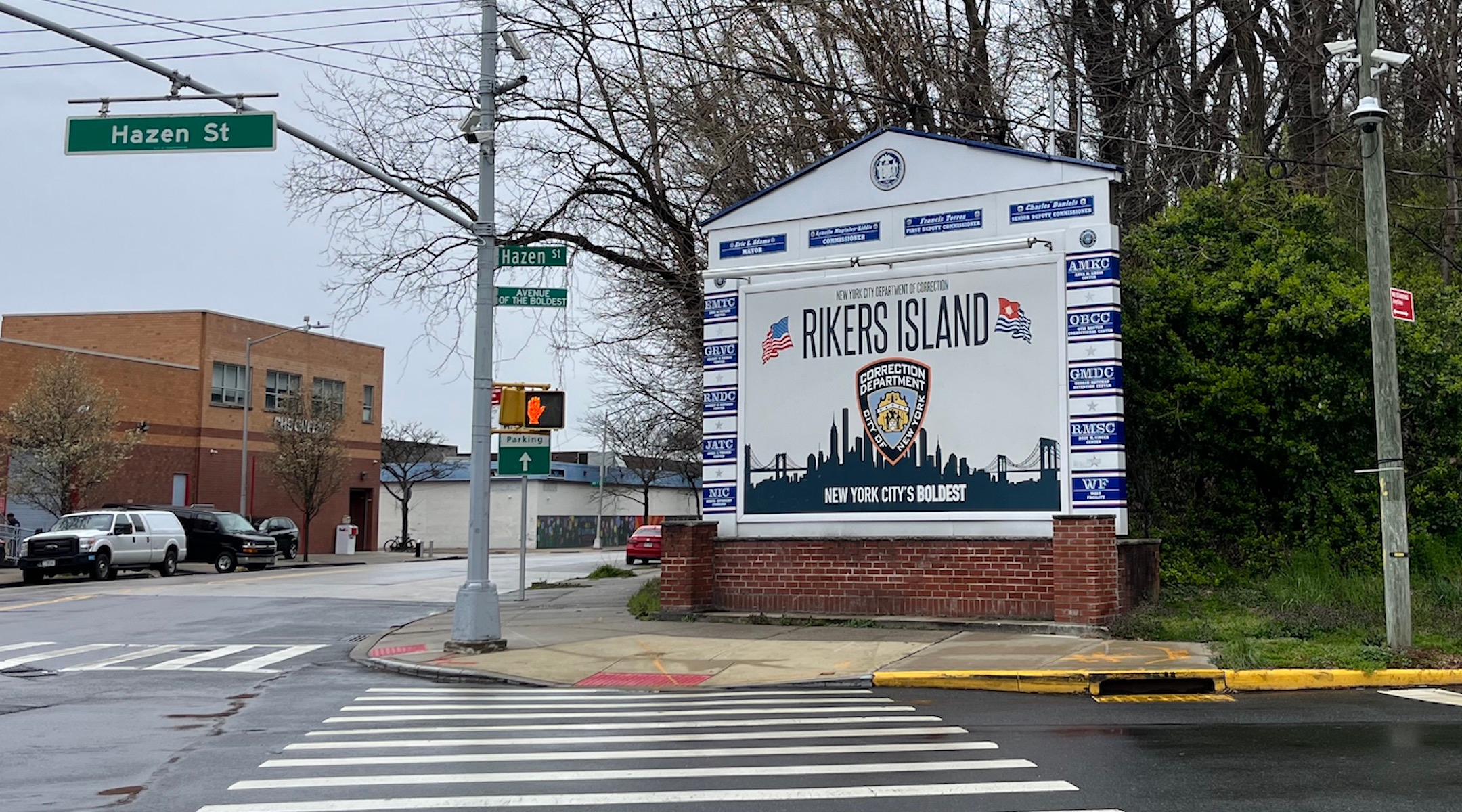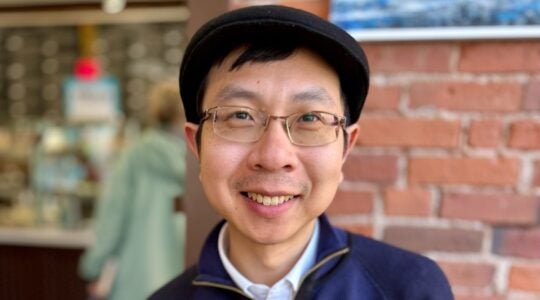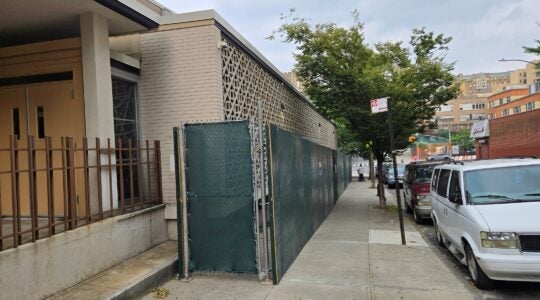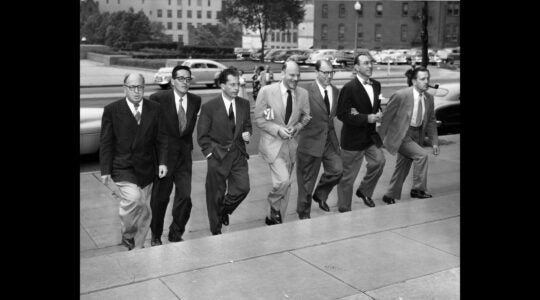(New York Jewish Week) — Growing up in the Bronx and Harlem, Howard Padilla said he has always been interested in Judaism. He even has a Star of David and the Hebrew letters for God tattooed on his chest and arms.
These days, as an inmate at Rikers Island — New York City’s largest and most notorious jail — Padilla, 45, has drawn even closer to Judaism. Since being imprisoned at the 413-acre East River complex, he’s become a regular at twice-weekly shacharit, or morning prayer services, as well as High Holiday services and Hanukkah and Purim parties.
“My rabbi inspired me to do so many things to keep my mental health top-notch — one of those things is practicing meditation,” Padilla said of Rabbi Gabriel Kretzmer-Seed, a Jewish chaplain for the NYC Department of Correction, during a recent morning service. “I feel happy and proud of myself and also, my rabbi, because I learned so much.”
Rikers Island, a pre-trial detention center in New York City, is New York state’s largest correctional facility. First opened in 1932, the jail complex has long been criticized for its harsh conditions — which include horror stories of inmates caged in tiny showers, suicides, beatings and more. In 2019, the New York City Council approved a budget of $8.7 billion to close the jail by 2027 and open four smaller jails in its place, though city officials recently warned that they won’t be able to meet the deadline.
City officials are also divided on a possible federal takeover of Rikers. But while the big guns battle it out, there are numerous grassroots efforts to make the living conditions a bit more bearable for those interred. Among them are a group of Jewish young adults affiliated with the Selma and Lawrence Ruben Base House on the Upper West Side, or Base, a communal space for Jews in their 20s and 30s.
Once a month, a handful of Base volunteers join Kretzmer-Seed at Rikers for Jewish prayer services with Jewish or Jewish-curious inmates like Padilla, providing company, conversation and Torah learning for some of the city’s most isolated citizens.
“I have a strong interest in prison abolition so I like to look for ways to build community with people inside,” volunteer Julia Burke, 37, told the New York Jewish Week. “As a new resident to New York who is on a conversion journey, I was really happy to find such an opportunity within the context of Judaism.”
The initiative is spearheaded by Rabbi Danny Stein, who, along with his wife Tamara, opened the UWS Base last summer. In addition to hosting Shabbat dinners, Torah study classes and social events, Stein is passionate about criminal justice reform, he said.
“Part of the ecosystem I’ve tried to develop within Base is this idea that we care about justice issues, and we care about issues of compassion, not just because it’s a good to do in the world — which it is, of course — but because it’s actually a deeply religious concept to help bring immediate relief, or try to systemically create relief for others,” Stein said.
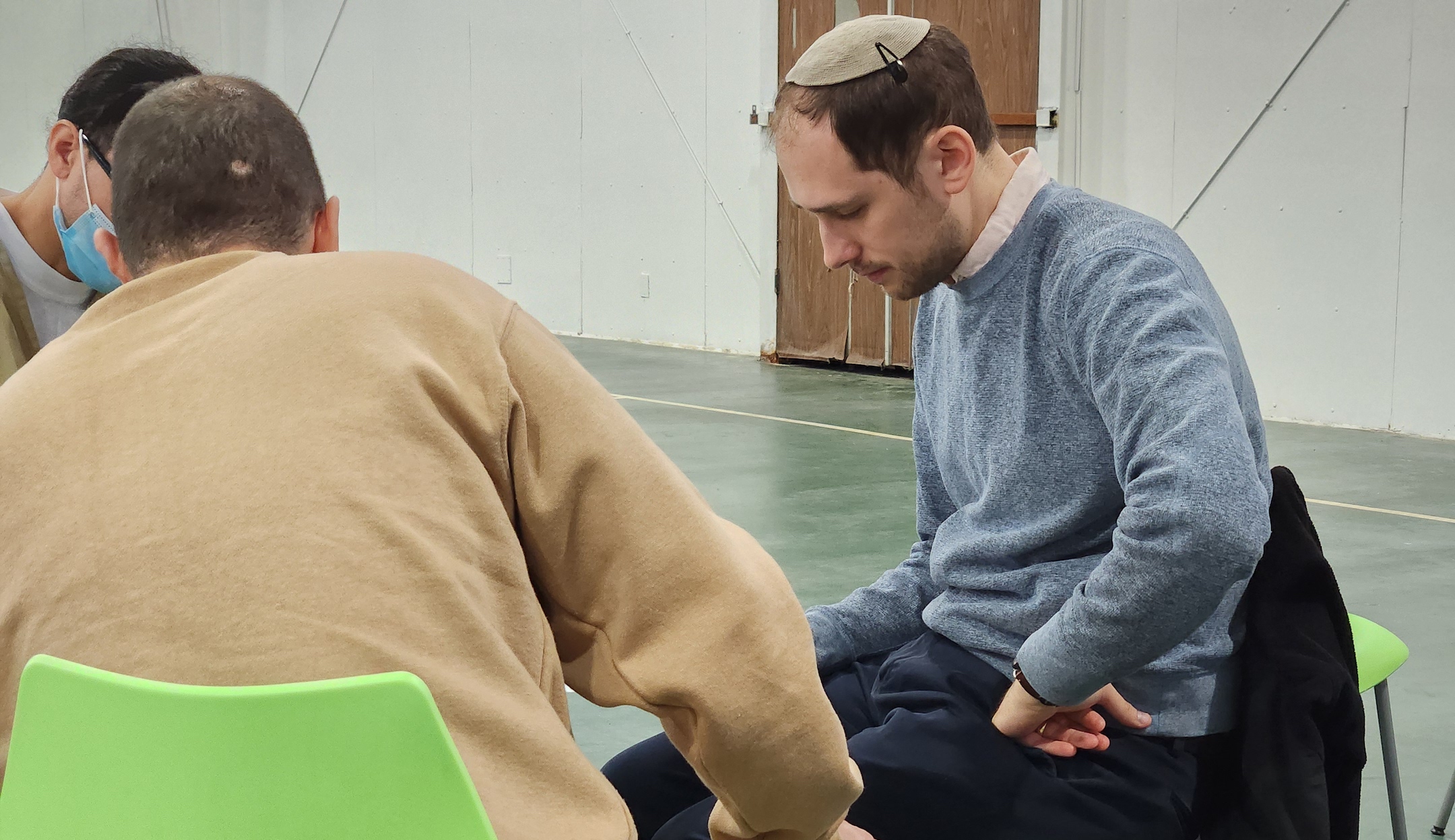
Rabbi Danny Stein with two men from Rikers, discussing Parashat Shemini. (NYC Department of Corrections)
A November 2023 grant from the Revson Foundation and the New York Jewish Coalition for Criminal Justice Reform has made the volunteers’ journey a bit easier: Base can now cover the cost of a taxi for volunteers, avoiding a time-consuming journey to the Q100 bus to Rikers, which originates from an out-of-the-way area in Astoria. The grant, according to the NYJCCJR, has enabled more than 60 volunteers to join services on Rikers, and it has also subsidized the creation of a DOC siddur, or prayer book.
The NYJCCJR formed in 2019 as a sub-branch of the Jewish Community Relations Council, and is dedicated to alleviating the inhumane conditions at Rikers and advocating for its closure. “So much of incarceration is about isolating people from their community,” said Rachel Lissy, the executive director of NYJCCJR. “If there’s even a small way that these visits bring community back into this space, it’s incredibly meaningful and also a very real reflection of Jewish values.”
“There’s real concern amongst all New Yorkers for what it means to create a safe and just city and what it means to create systems that support public safety — there’s great concern about what’s happening in Rikers,” Lissy added. “Joining services is a really powerful way to bear witness and to meet the real folks who are impacted and in custody, especially in the context of this spiritual space that we all share.”
At 9 a.m. on Monday morning, Stein and five Base volunteers met at the Rikers Island Bridge, a restricted-access thoroughfare that connects Northern Queens to the island. The group met well in advance of the 10 a.m. service in order to allow ample time to check-in through airport-like security.
On the Island, the volunteers joined Kretzmer-Seed, the DOC chaplain, and six inmates for that morning’s service, which was held at a gym in Rikers’ West Facility, which houses some 500 men. After a few minutes of introduction, participants sang some of the morning prayers, including the Shema, V’Ahavta and Mi Sheberach, the prayer for healing, before sharing their own thoughts and blessings.
“I’m very proud of you for breaking that barrier of fear to come here because most people feel scared and afraid, since society looks at us as criminals, killers, all these bad things,” Padilla said to the group. “But we’re none of that.”
“We’re humans, we’re people,” he continued. “We feel pain, we bleed, we die. I really appreciate you coming over here, rabbi. You’re bringing to us a lot of peace, a lot of happiness.”
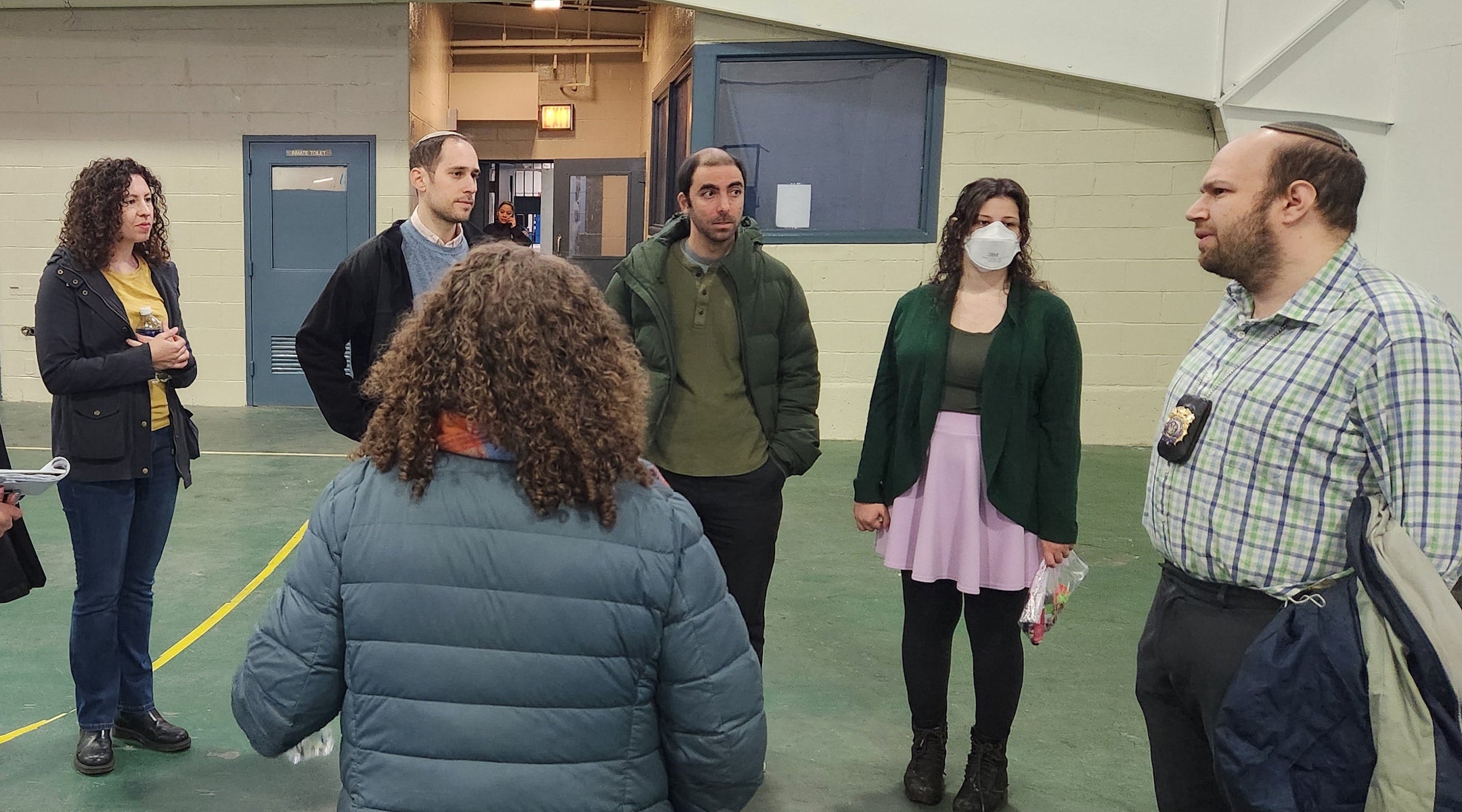
Rabbi Gabriel Kretzmer-Seed, right, speaks with volunteers about his work as the Jewish chaplain at Rikers. (NYC Department of Corrections)
Kretzmer-Seed estimates that around 25 people — or about 5% of the population interred at the West Facility — indicated that they were Jewish when they were first incarcerated at Rikers. Among those 25, he said, only about a quarter to a third were either born Jewish or grew up Jewish.
“It’s no secret that some people just sign up for the kosher food because they think it’s better or healthier or safer,” Kretzmer-Seed said.
As for those who were at Monday’s service, “I think almost everyone here didn’t grow up Jewish at all — there’s a few who identify as Hebrew Israelite,” Kretzmer-Seed said. However, he noted that those who attend weekly services are “individuals who take it very seriously and are trying to learn.”
Kretzmer-Seed said that the benefit of having volunteers come to Rikers “goes both directions.”
“For people in custody, it shows them that there’s a Jewish community on the outside that cares about them, and that wants to take the time to come here,” he said. “For the visitors, to see that the people in custody are New Yorkers and human beings just like us, who made a mistake or were in the wrong place at the wrong time, or had a bad day and ended up here — to be able to connect with them and have that human connection and concern is powerful.”
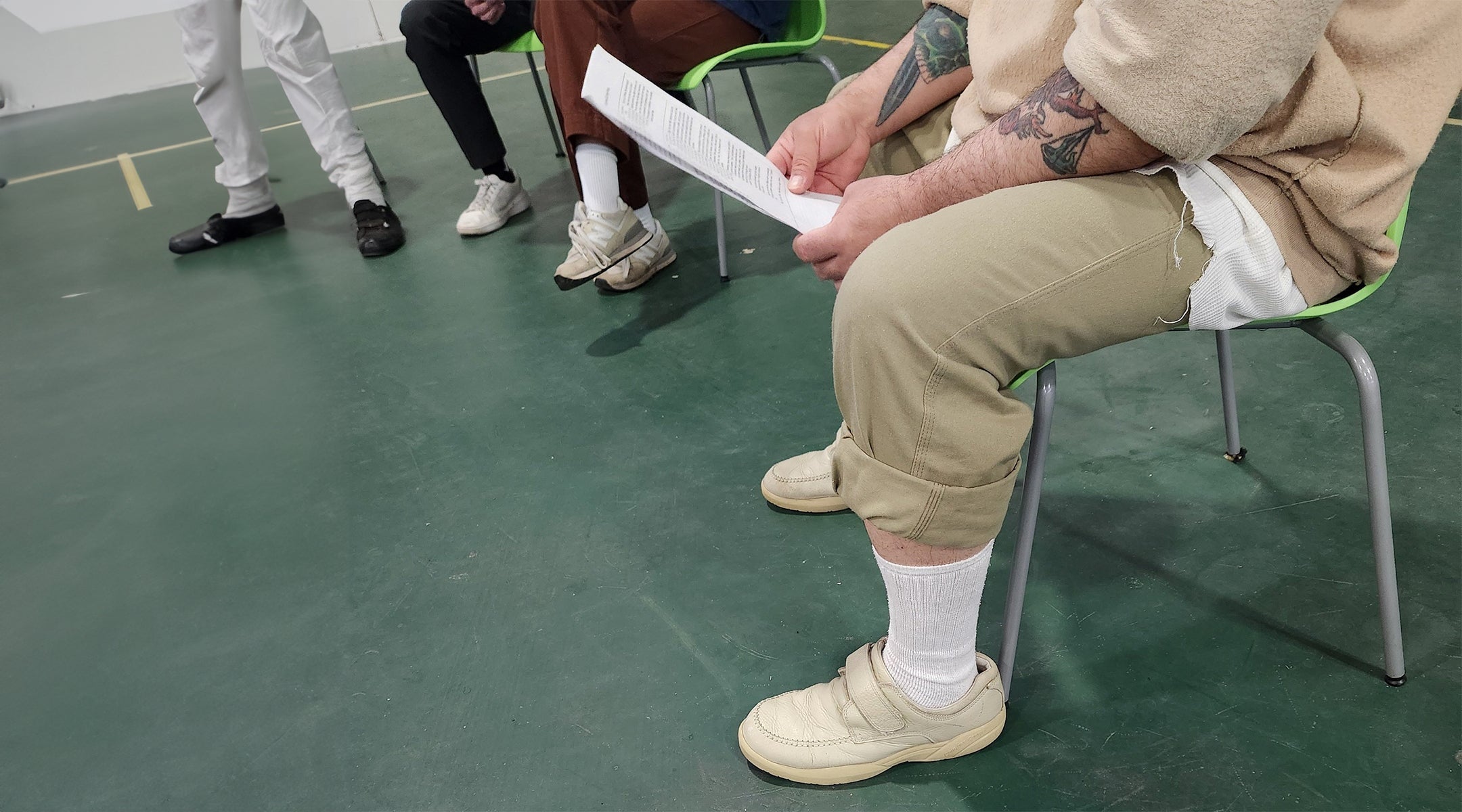
A man holds the source sheet for that day’s Torah study. (NYC Department of Corrections)
“These are small ways that our community can help bring some light for folks who are incarcerated and really identify the ways in which we can help people feel human as well,” Stein said.
After the prayers on Monday morning, Stein passed around a source sheet with English and Hebrew text from the week’s Torah portion, and assigned everyone to smaller groups to discuss. The entire group then came together once more to share their final thoughts and say goodbye.
“I want to thank each and every one of you for being here,” Padilla told the group. “I keep telling the rabbi that this amazes me.”
It was a moving experience for Base volunteer Josh Deiner, too. “At Rikers, I felt as if our service was a moment in time where my outside worries fell away completely… I was absorbed in the conversations I had with the people I met and learned a lot,” he wrote on Instagram about the services. “It is hard to describe the feeling, but I am very grateful for being given a chance to contribute and learn from this supportive group.“
The New York Jewish Week brings you the stories behind the headlines, keeping you connected to Jewish life in New York. Help sustain the reporting you trust by donating today.
